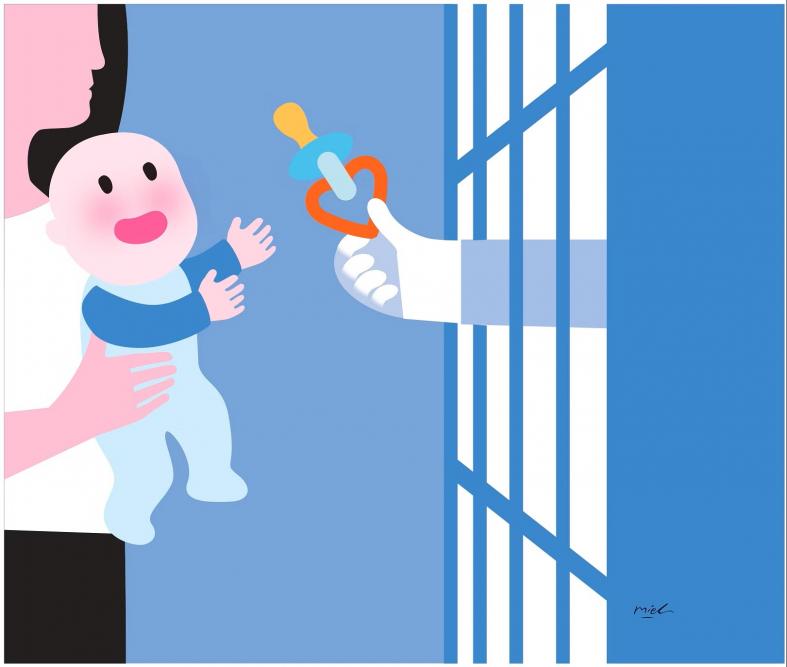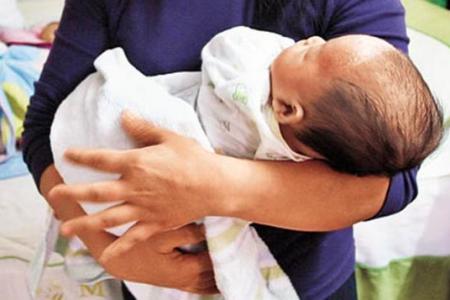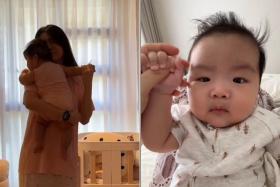Bringing up baby in prison: How inmates cope with pregnancy and childcare
Ms Sally (not her real name) was halfway through serving a drug rehabilitation sentence, when her fellow inmates started telling her she looked different.
She was losing weight even though she was eating, and her tummy felt a bit bigger. Ms Sally, then 28 years old, suspected she was pregnant.
Female inmates are given a pregnancy test before being onboarded, so the prison warden had doubts when Ms Sally brought up her concerns.
Still, she was sent for a urine test and it was found that she was five months pregnant. She was transferred to another part of the prison that is closer to medical services.
Speaking to The Straits Times, she said: “The worry only came after, it was shock at first. ”
The prison reviewed her rehabilitation sentence, taking into account her pregnancy. It ordered an earlier release and put her on home-tagging.
As there was still a chance she could give birth before her release, she was told to think about the care options for her baby.
She said: “There are inmates who are single mothers and do not have family support. For me, I’m on the fortunate side as I have my husband who is very supportive, and who would take care of the baby if I wasn’t released before birth.”
In response to queries from The Straits Times, Singapore Prison Service (SPS) said that about 100 women inmates had given birth during their prison sentence in the past five years.
Of these cases, three babies were raised in a prison cell with their mothers after birth. All three mothers were foreigners who did not have alternative childcare arrangements, SPS said.
The three babies ranged in age from about one month to about 16 months when their mothers were released.
According to the law, a child born to a female inmate during her imprisonment may be allowed to stay with her in prison, if it is considered to be in the child’s best interest.
SPS said there are four caregiving options for inmates who give birth during their incarceration.
Inmates with family support would typically opt for the baby to be cared for by family members, such as spouses, parents and relatives. Close friends can also take on this role if an inmate is estranged from their family.
If there are no suitable kin caregivers, SPS will work with the Ministry of Social and Family Development to provide foster care for the baby.

If the inmate is a foreigner and has no alternative caregiving option, SPS may consider it to be in the best interests of the child to remain with the mother in prison.
But such instances are very rare, it said.
If a mother needs to raise her baby in prison, special provisions are made for the baby, like warm water for bathing, clothes, diapers, pillow, mattress, wipes, sterilisation equipment and bottles.
Milk and other age-appropriate food are also provided, to ensure that the baby receives proper nutrition, SPS said.
ST understands that even though the law allows for babies to stay in prison with their mother, the general preference is for mothers to explore other caregiving options. This is because the prison environment is not seen as conducive for raising a child.
Pregnant inmates are jointly cared for by the prison medical officer and a doctor from KK Women’s and Children’s Hospital (KKH). These inmates are provided a mattress to sleep on in their cells, instead of the straw mats that other inmates use.
At the later stages of pregnancy, they will be transferred to the medical ward where medical staff are present round the clock to monitor more closely.
When the inmate goes into labour, she is transferred to KKH for delivery, and will return to prison to serve the rest of the sentence only after she is deemed fit to do so by the doctors at KKH.
Pregnant inmates understand that growing up in a prison cell may not be a suitable environment for their baby, no matter how much they want to be close to their child, said assistant senior social worker at Fei Yue Community Services Janet Liam.
She said: “Even for adults, it is difficult to adjust (to prison). What more a newborn?”
Fei Yue runs Project Baby, a programme that supports pregnant inmates and offers them guidance during their pregnancy in prison.
Sessions are held in the prison compound, to give the women a safe space to voice their worries or concerns about their babies, and learn about the care options available.
The programme has worked with 55 women since it started in 2020.
One of the concerns that these women have is whether they will have a close relationship with their children if they are going to be in prison for a few years, Ms Liam said.
“They would not have been with their children since birth. So it is very hard for them as a mother, because all mothers would hope to raise their children. But because of the crimes they have committed, they cannot fulfil that.”
Get The New Paper on your phone with the free TNP app. Download from the Apple App Store or Google Play Store now


